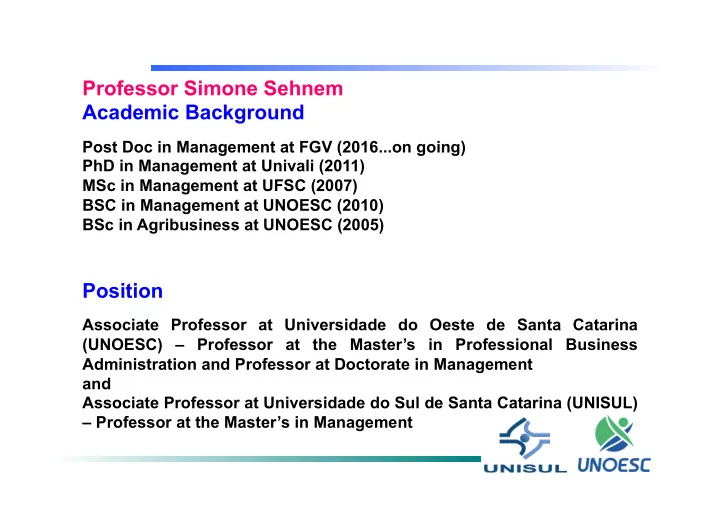

Professor Simone Sehnem Academic Background Post Doc in Management at FGV (2016...on going) PhD in Management at Univali (2011) MSc in Management at UFSC (2007) BSC in Management at UNOESC (2010) BSc in Agribusiness at UNOESC (2005) Position Associate Professor at Universidade do Oeste de Santa Catarina (UNOESC) – Professor at the Master’s in Professional Business Administration and Professor at Doctorate in Management and Associate Professor at Universidade do Sul de Santa Catarina (UNISUL) – Professor at the Master’s in Management
About 650Km
Research Theme Sustainable Supply Chain Circular Economy Resources (Resource Based-View) Sectors Agribusiness – food production (dayry, poultry, porks) and organic foods Agricultural cooperatives – Aurora (approximately 100 thousand families associated) Credit cooperative – management resources
Some Findings
Some Findings
Some Findings
Workshop: “Indicators and Metrics for Socially Inclusive Waste Management and Resource Efficiency in Supply Chains: Measuring and Reporting to Embed Sustainability in Policy and Practice” : organic cane
Native is a company belonging to the Balbo do Brasil Group that produces organic sugar and alcohol. Balbo is composed of three sugarcane mills, two of which are located in São Paulo State and one in Minas Gerais State. Currently, at the Santo Antonio Plant, the production is 600 thousand litres of alcohol and 12,000 50 kg bags of sugar per day. In the São Francisco Mill, the second in this family business, the daily production is 420 thousand litres of alcohol and 8,000 bags of sugar. Leontino Balbo Júnior Vice President of Native
14 years ago, the Santo Antônio and São Francisco mills were self-sufficient in electric power, generated in their own units from the sugarcane bagasse. It sells its products in 64 countries of all continents, including supplying organic alcohol to the cosmetics industry. According to the executive interviewed, Native Native is the world's largest sugarcane producer. Florianópolis The company is in its third succession process.
The cultivation covers a land area of 20,000 hectares. The production model adopted by Native for organic sugar makes possible not only the total neutralization of the carbon emissions in the atmosphere, but also to act as a carbon sink, taking out a larger volume than the emission itself. The conventional sugarcane production system included the use of pesticides, chemical fertilizers, burning to harvest the crop, manual cutting, throwing the cane on to the ground, dirtying it, thus requiring industrial w a s h i n g , i n c u r r i n g a n a v e r a g e consumption of 4 million litres of water per hour.
Circular economy additionally incorporates the design of products and services. It is based on 3 main principles: a) disposal of waste; b) separating biological nutrients from technical nutrients, where the former are returned to the biosphere and the latter are reused indefinitely; c) use renewable energy to reduce resource dependence and increase system resilience (WEF, 2014). It is estimated that the circular economy represents an opportunity of approximately US$ 1 trillion, besides providing important environmental benefits (WEF, 2016).
Practices adopted by the circular economy: - Reuse - Remanufacturing - Recycling - Circulation of resources - Use of clean renewable energy - Separation of biological nutrients and technical nutrients, where the former is returned to nature and the latter is recycled/reused indefinitely
Production Harvest Raw materials and Manufacturing material reuse of products Plantation Technical Direct products consumption Biological Technical Cycle Cycle Damaged Products Mineral and organic Biological Separation and nutrients degradation disposal of waste
Pioneers in Brazil in mechanised sugarcane harvesting
No more burning the sugar cane for harvesting
No more pesticides In the first 3 years of the transition to organic production, productivity decreased
Chemical fertilizers are not used
Regeneration of soil by means of biological assets and natural cycles
Special lighter harvesting machinery
Use of high flotation tyres to reduce soil compaction
Pests are fought with their natural enemies (e.g. wasps that combat boring insects)
Planting of spices among the rows of sugarcane
Positive interference in the natural habitats of the wild animals of the region
Improving water quality
Generation and use of clean energy
Organic cane production with superior productivity and greater field longevity (already reached 14 cuts of cane, with potential for 20)
Range of manufactured products
Products have added value by being organic
Native Certifications: The certification of a plant, animal or industrial production indicates that the following work was carried out: - Periodic visits by an inspector at the place of production; - Evaluation of the inspection report by a board consisting of farmers, processors, academics, technicians and representatives of consumers; - Analysis of residues to verify the level of product purity; - Approval of the production unit according to organic or biodynamic quality standards.
Partnership with universities and research centres, such as Embrapa, to seek technological improvements, monitoring and evaluation of performance indicators of the farms and the industry
Native Retail Outlets, and joining the Union for Ethical BioTrade The Union for Ethical BioTrade is a non- profit association that promotes "Respectful Supply" of ingredients derived from biodiversity. Members undertake to progressively ensure that their supply p r a c t i c e s p r o m o t e b i o d i v e r s i t y conservation, respect traditional knowledge and ensure equitable sharing of benefits throughout the supply chain
Improvement Opportunities: § Use of biodegradable packaging; § Reverse logistics of non- biodegradable packaging; § Calculate the ecological footprint of the distribution, and create compensation alternatives; § Conscious marketing strategies § Infinite recycling of non-organic waste from the production system
Avenues for Further Collaboration Circular Economy: Comparative case studies among different countries to understand how to deploy, how to monitor performance indicators and opportunities to increase the circularity of resources Sustainable Supply Chain: comparative studies of supply chains from different countries and global chains
Simone Sehnem Email: simonesehnem_adm@yahoo.com.br Tel.: +55 49 9998-8832
Recommend
More recommend